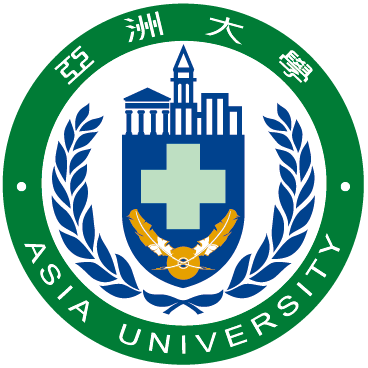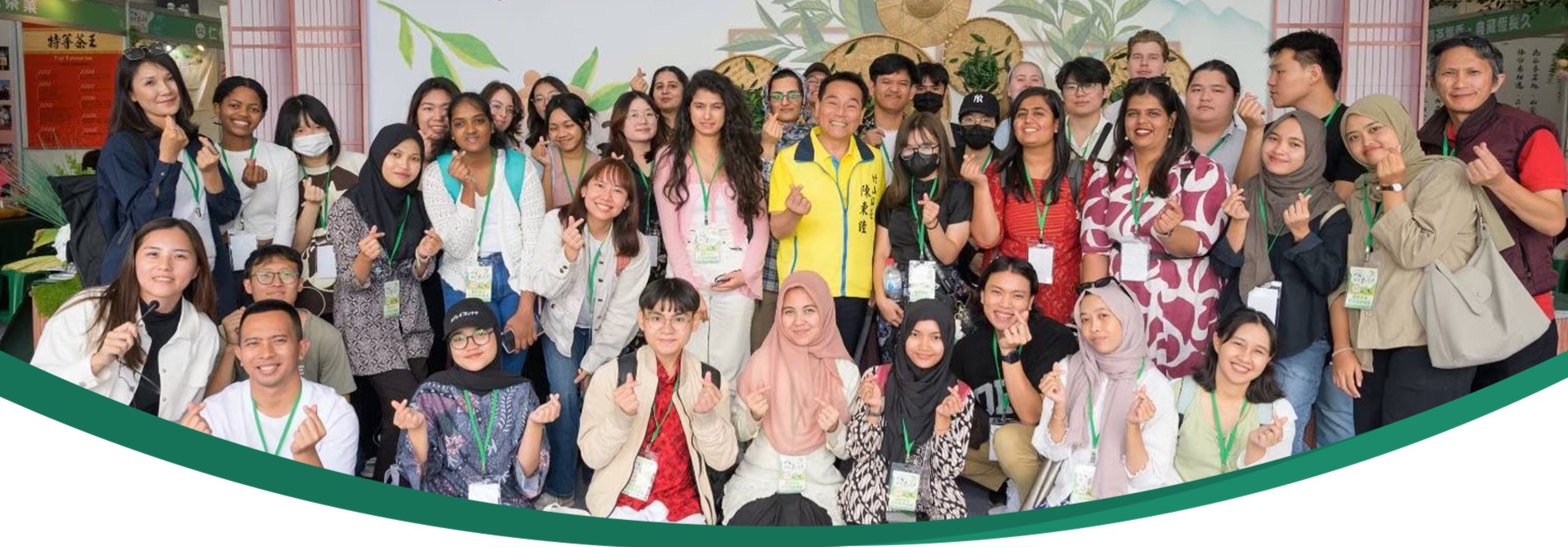Asia University Chinese Language Center Launches Summer Chinese Language Program with 30 International Student
Asia University's Chinese Language Center launched its 2025 Summer Chinese Language and Culture Program (Summer Program – Language and Culture) from August 4 to August 22, 2025, welcoming 30 students from sister universities in Indonesia, Japan, South Korea, and India. The students gathered in Taiwan to study Chinese language and culture.
During the opening ceremony, Professor Mao Yuanzhen, Director of the Chinese Language Center, encouraged the students to make the most of their summer at Asia University by immersing themselves in language learning, exploring Taiwanese culture, and discovering Taiwan. She emphasized that this is a vluable opportunity to not only practice speaking Chinese but also to embrace every interaction as a chance for personal growth. She expressed hope that, after the course, the students would return home with more fluent language skills and wonderful memories. After completing the Chinese language courses, students will have the opportunity to further their studies or pursue higher education in Taiwan, applying their Chinese language knowledge in real-world contexts. Asia University, ranked among the top ten universities in Taiwan and recognized as a prestigious institution in Asia and worldwide, offers both English-taught and Chinese-taught degree programs, providing a comprehensive environment for language learning and degree pursuit.
Since 2019, Asia University's Chinese Language Center has been offering summer Chinese language programs, both in-person and online, each year with support from the Ministry of Education. This year's program spans three weeks, with six hours of classes each day, focusing on language learning and cultural experiences. The language courses teach practical Chinese topics, including campus life, leisure, social interactions, shopping, travel, environment, technology, and healthcare. The topics are diverse and engaging. Teachers incorporate a variety of classroom activities, such as quizzes, role-playing, speaking games, and group exercises, allowing students to effectively practice and produce language through various forms of input and stimuli.
In the cultural segment, teachers provide cultural knowledge, show cultural films, and introduce students to Taiwan’s tea culture, gift-giving customs, multicultural landscape, and traditional handicrafts, offering a fun and insightful exploration of Chinese culture.
As part of the summer program, students also took part in off-campus excursions, visiting the Wufeng Lin Family Mansion, the Miaoli Tongxiao Sand Sculpture Exhibition, and the Flying Cow Ranch. These cultural experiences allowed students to not only experience Taiwan’s humanistic and natural landscapes firsthand but also apply their Chinese skills in real-life interactions. For example, during the heritage tour, students learned to describe architectural beauty, practiced expressing their impressions at the sand sculpture exhibition, and engaged in dialogue during the farm activities. These lively experiences made language learning more engaging and practical, helping students improve their speaking and listening skills in a relaxed atmosphere while deepening their understanding and connection with Taiwan's culture.
The teaching staff, with rich industry experience, holds master's degrees in Chinese language teaching and have years of teaching experience. They use either full Chinese or English as a supplementary language to teach according to the students' levels and course topics. Additionally, the center has arranged for Asia University students to serve as teaching assistants and learning partners, helping students practice in groups and individually, reviewing class materials, tracking student progress, and addressing learning difficulties. During the final week of the program, students completed a final report, oral exam, and written exam to showcase their learning progress. The students created oral presentations using Chinese vocabulary, grammar, and knowledge they learned during the course, alongside self-made PowerPoint slides. Special recognition was given to students with outstanding presentations at the closing ceremony. Upon completion of the intensive course and passing the exams, each student received a certificate of completion and a transcript, which can be credited towards their home university’s academic program.
Kety H., a student from BINUS University in Indonesia, shared that this was his first time learning Chinese. Despite some topics being challenging, he was impressed by the lively and interactive teaching methods and the teachers' patience. Mahiro K., a student from Suyama Women's University in Japan, mentioned that she had already studied some basic Chinese in Japan, and this summer program provided an excellent opportunity to improve her language skills with Taiwanese teachers. She hopes to return to Taiwan in the future for further study.
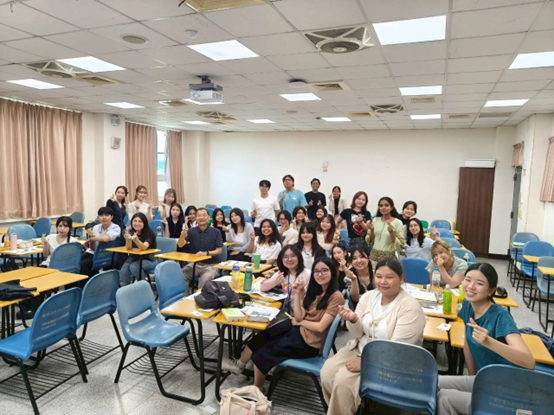
Caption: Group photo of the Summer Chinese Language Program. Dr. Lin Junwei (fourth from the left), Director of International Affairs, encourages the international students to improve their Chinese language skills during the summer break.
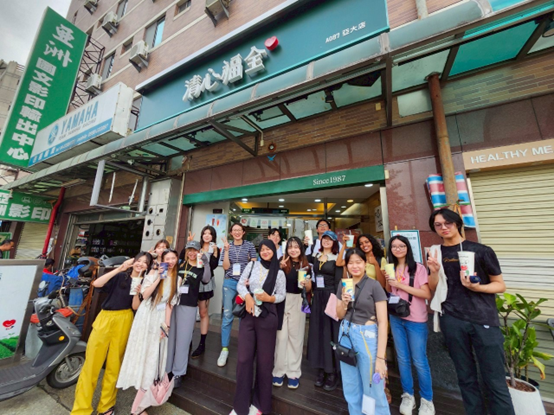
Caption: The teachers from the Chinese Language Center led students to a bubble tea shop, where they practice ordering drinks in Chinese using the language skills learned in class.
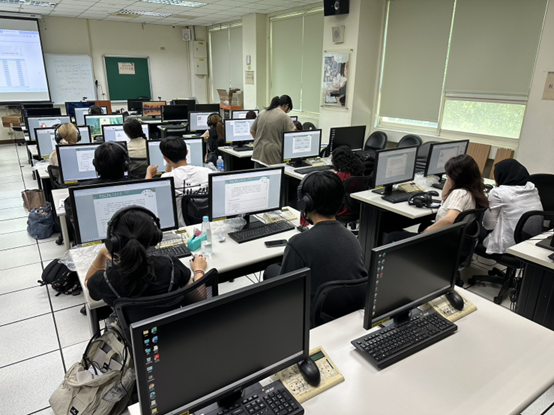
Caption: Students take a mock test for the TOCFL (Test of Chinese as a Foreign Language) to simulate the Chinese proficiency examination.
During the opening ceremony, Professor Mao Yuanzhen, Director of the Chinese Language Center, encouraged the students to make the most of their summer at Asia University by immersing themselves in language learning, exploring Taiwanese culture, and discovering Taiwan. She emphasized that this is a vluable opportunity to not only practice speaking Chinese but also to embrace every interaction as a chance for personal growth. She expressed hope that, after the course, the students would return home with more fluent language skills and wonderful memories. After completing the Chinese language courses, students will have the opportunity to further their studies or pursue higher education in Taiwan, applying their Chinese language knowledge in real-world contexts. Asia University, ranked among the top ten universities in Taiwan and recognized as a prestigious institution in Asia and worldwide, offers both English-taught and Chinese-taught degree programs, providing a comprehensive environment for language learning and degree pursuit.
Since 2019, Asia University's Chinese Language Center has been offering summer Chinese language programs, both in-person and online, each year with support from the Ministry of Education. This year's program spans three weeks, with six hours of classes each day, focusing on language learning and cultural experiences. The language courses teach practical Chinese topics, including campus life, leisure, social interactions, shopping, travel, environment, technology, and healthcare. The topics are diverse and engaging. Teachers incorporate a variety of classroom activities, such as quizzes, role-playing, speaking games, and group exercises, allowing students to effectively practice and produce language through various forms of input and stimuli.
In the cultural segment, teachers provide cultural knowledge, show cultural films, and introduce students to Taiwan’s tea culture, gift-giving customs, multicultural landscape, and traditional handicrafts, offering a fun and insightful exploration of Chinese culture.
As part of the summer program, students also took part in off-campus excursions, visiting the Wufeng Lin Family Mansion, the Miaoli Tongxiao Sand Sculpture Exhibition, and the Flying Cow Ranch. These cultural experiences allowed students to not only experience Taiwan’s humanistic and natural landscapes firsthand but also apply their Chinese skills in real-life interactions. For example, during the heritage tour, students learned to describe architectural beauty, practiced expressing their impressions at the sand sculpture exhibition, and engaged in dialogue during the farm activities. These lively experiences made language learning more engaging and practical, helping students improve their speaking and listening skills in a relaxed atmosphere while deepening their understanding and connection with Taiwan's culture.
The teaching staff, with rich industry experience, holds master's degrees in Chinese language teaching and have years of teaching experience. They use either full Chinese or English as a supplementary language to teach according to the students' levels and course topics. Additionally, the center has arranged for Asia University students to serve as teaching assistants and learning partners, helping students practice in groups and individually, reviewing class materials, tracking student progress, and addressing learning difficulties. During the final week of the program, students completed a final report, oral exam, and written exam to showcase their learning progress. The students created oral presentations using Chinese vocabulary, grammar, and knowledge they learned during the course, alongside self-made PowerPoint slides. Special recognition was given to students with outstanding presentations at the closing ceremony. Upon completion of the intensive course and passing the exams, each student received a certificate of completion and a transcript, which can be credited towards their home university’s academic program.
Kety H., a student from BINUS University in Indonesia, shared that this was his first time learning Chinese. Despite some topics being challenging, he was impressed by the lively and interactive teaching methods and the teachers' patience. Mahiro K., a student from Suyama Women's University in Japan, mentioned that she had already studied some basic Chinese in Japan, and this summer program provided an excellent opportunity to improve her language skills with Taiwanese teachers. She hopes to return to Taiwan in the future for further study.

Caption: Group photo of the Summer Chinese Language Program. Dr. Lin Junwei (fourth from the left), Director of International Affairs, encourages the international students to improve their Chinese language skills during the summer break.

Caption: The teachers from the Chinese Language Center led students to a bubble tea shop, where they practice ordering drinks in Chinese using the language skills learned in class.

Caption: Students take a mock test for the TOCFL (Test of Chinese as a Foreign Language) to simulate the Chinese proficiency examination.
